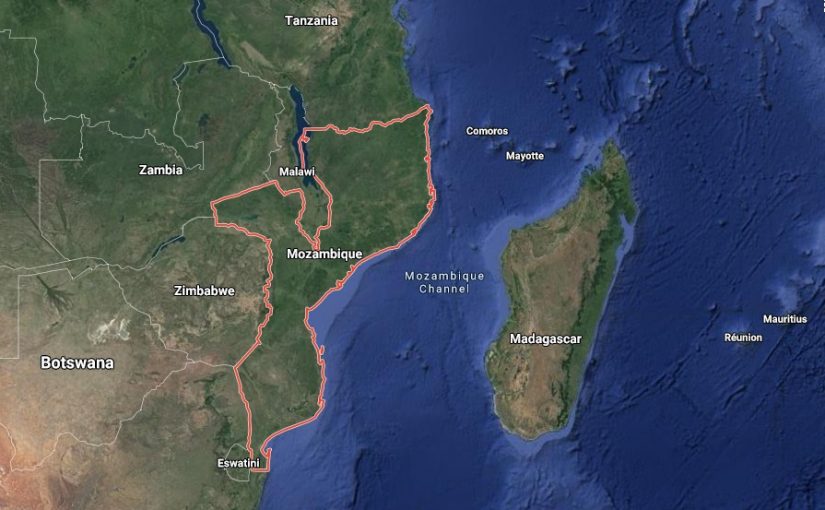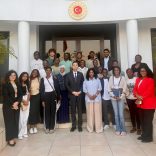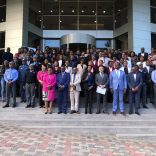Mozambique: UN warns of "relentless cascade of emergencies"
Mozambique: Palma violence underlines need for cross-border surveillance – UNODC

Image: Google Maps
The rebel attack on Palma, killing dozens and threatening gas projects in northern Mozambique, reinforces the alert for cross-border surveillance in that part of Africa, said César Guedes, one of the United Nations officials in the country.
“This is again a wake-up call for the need for greater cross-border cooperation of Mozambique with neighbouring countries,” namely with Tanzania, the representative of the United Nations Office on Drugs and Organised Crime (UNODC) in Mozambique said in an interview with Lusa on Friday, a month after the attack.
Mozambique and Tanzania “are brotherly countries,” he stressed in an Internet conversation. “The Tanzanian hand has always been a fraternal hand” since Mozambican independence, and this is another moment “that affects both countries” because the rebel attacks in Cabo Delgado “have tentacles across borders”.
Strengthening cooperation should cover other countries, “such as Congo, Malawi or Kenya and take a look across the sea such as the Comoros, France,” through the overseas territory of the Mayotte islands, “and Madagascar. These are other borders very close to Cabo Delgado, especially Palma.”
“There is great commercial interest in the area of gas and oil, in which French companies have large investments and the nearest ‘Schengen’ territory [area of 26 European countries without border controls] is Maiote,” about 600 kilometres east of Palma, he warns.
UNODC has provided training so that Mozambique can participate more and more in maritime surveillance, which César Guedes considered being an important part of cross-border cooperation.
Based on what he has seen in South America and Asia, Guedes believes that “a situation of chaos is the ideal situation” for transnational criminal networks to carry out “their illicit activities”.
In other countries, “these criminals contribute with a tax” paid to the attackers: “I am not sure if this happens in Mozambique, but I would be surprised if it didn’t. It is the common denominator in countries such as Peru, Colombia, Bolivia, Afghanistan or Syria”, he said.
The Mozambican authorities should be alert to any increase in animal, drug or illegal fishing trafficking that may be escaping surveillance in Cabo Delgado due to the attention focused on the conflict, warns César Guedes.
“These groups [rebels], fools they are not,” he said in the interview with Lusa, considering that the attack on Palma seems to have had two objectives: looting and gaining notoriety.
“The boat with food”, which had arrived in Palma, “and the tactical aspect” of attacking Western targets, “may be part of the same equation”, he stressed.
“This was not an unplanned thing, I think the opposite,” he said, considering that there was analysis and information gathering by the insurgents to choose “the opportune moment” for the attack.
In the case of Palma, “the target was really foreign interest, with media impact”, César Guedes said.
“Whenever these irregular armed groups come in, carrying out attacks” in different parts of the globe, “everyone thinks it’s a small thing, but then it snowballs”, he described.
UNODC is dedicated to building the capacity of the Mozambican authorities and since 2019 has promoted 10 training actions on counter-terrorism, benefiting investigative police, judicial agents and other stakeholders.
In another area, Pemba, Beira and Maputo are some of the ports where training on maritime surveillance has been held to improve early warning capabilities and approach to suspicious vessels, following international protocols.
UNODC has also provided technical support for creating a joint maritime security body based in Maputo, bringing together Mozambique, South Africa and Tanzania.
The three countries signed a memorandum of cooperation in 2018. The office should open in the coming months, César Guedes said, after overcoming constraints to movement due to Covid-19 and overcoming electoral calendars in each country.
Mozambique will have an office for strategy, collection and exchange of information between the navies of the three countries, where each will have an expert, along with those of UNODC, to strengthen patrolling and security along the three contiguous coasts – from north to south, Tanzania, Mozambique and South Africa – of the southwest Indian Ocean, including the Mozambique Channel.
Armed groups have terrorised Cabo Delgado since 2017, with some attacks claimed by the ‘jihadist’ group Islamic State, in a wave of violence that has led to more than 2,500 deaths according to the ACLED conflict registration project and 714,000 displaced people according to the Mozambican government.
The most recent attack was on 24 March against the town of Palma, causing dozens of deaths and wounded, with no final numbers yet.
The Mozambican authorities regained control of the town, but the attack led oil company Total to abandon indefinitely the site of the gas project scheduled to start production in 2024 and on which many of Mozambique’s economic growth expectations for the next decade are anchored.













Leave a Reply
Be the First to Comment!
You must be logged in to post a comment.
You must be logged in to post a comment.